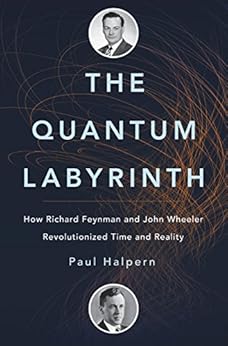 |
| Ed Witten (from Quanta magazine) |
Peter Woit's recent post points towards an interview of Witten by Natalie Wolchover of Quanta magazine. Here is some of what Witten had to say:
"I tend to think that there isn’t a precise quantum description of space-time — except in the types of situations where we know that there is, such as in AdS space. I tend to think, otherwise, things are a little bit murkier than an exact quantum description. But I can’t say anything useful.By synchronicity, I'm currently reading this (which I have also reviewed):
The other night I was reading an old essay by the 20th-century Princeton physicist John Wheeler. He was a visionary, certainly. If you take what he says literally, it’s hopelessly vague. And therefore, if I had read this essay when it came out 30 years ago, which I may have done, I would have rejected it as being so vague that you couldn’t work on it, even if he was on the right track."
 |
| Amazon link |
which is a biographical account of the tangled lives of John Wheeler and Richard Feynman. Wheeler was the visionary, the 'big picture' guy, while Feynman was the 'let's get down to the basics and do the calculations' artisan-theorist.
Somehow the whole was greater than the parts: birds and frogs.
Witten continues:
"I tend to assume that space-time and everything in it are in some sense emergent. By the way, you’ll certainly find that that’s what Wheeler expected in his essay. As you’ll read, he thought the continuum was wrong in both physics and math. He did not think one’s microscopic description of space-time should use a continuum of any kind — neither a continuum of space nor a continuum of time, nor even a continuum of real numbers.The whole interview is Witten playing the role of Feynman to the shade of Wheeler.
On the space and time, I’m sympathetic to that. On the real numbers, I’ve got to plead ignorance or agnosticism."
---
Other posts on emergent spacetime: and here's Wheeler's essay (pdf) which Witten referenced - it is infuriatingly vague, written in Wheeler's characteristic mangled-syntax english.
That Wheeler paper from 1989 certainly is vague in its formulation: however it does have several references to Wheeler's older papers which might fill in some background.
ReplyDeleteWitten does point to one ambiguity about it: whether Wheeler was referring to "bit" as in Information Theory or actually "Qubit" which is a different construct now popular in Quantum Information theory. The papers Wheeler refers to would have meant "bit" not "Qubit", so if that paper were written today it would have to make that point clearer.
Both Wheeler and Witten have tried to get help from Logicians, but were to receive none. (Recall the "self-referential deductive system" reference in the Wheeler paper.) I think though that Logic *can* help, but via ideas imported from Computation theory. In terms of mathematics this maybe leads to a subject called "Locale Theory" for these kinds of foundations.
Yes, I looked at the reference:
Deletehttps://en.wikipedia.org/wiki/Pointless_topology
but I'm not much wiser as to applications! :-)